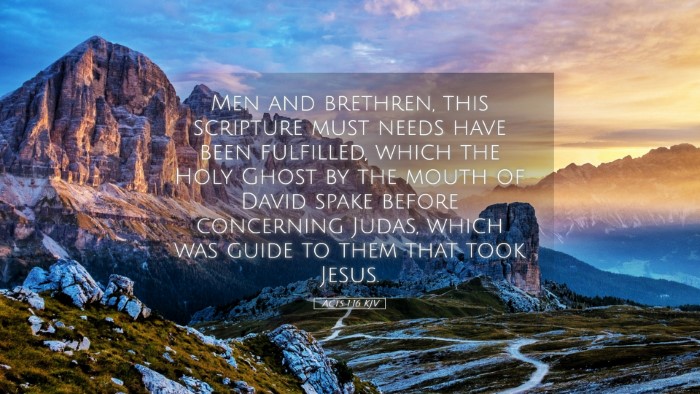Old Testament
Genesis Exodus Leviticus Numbers Deuteronomy Joshua Judges Ruth 1 Samuel 2 Samuel 1 Kings 2 Kings 1 Chronicles 2 Chronicles Ezra Nehemiah Esther Job Psalms Proverbs Ecclesiastes Song of Solomon Isaiah Jeremiah Lamentations Ezekiel Daniel Hosea Joel Amos Obadiah Jonah Micah Nahum Habakkuk Zephaniah Haggai Zechariah MalachiActs 1:16
Acts 1:16 KJV
Men and brethren, this scripture must needs have been fulfilled, which the Holy Ghost by the mouth of David spake before concerning Judas, which was guide to them that took Jesus.
Acts 1:16 Bible Commentary
Commentary on Acts 1:16
Verse: "Men and brethren, this scripture must needs have been fulfilled, which the Holy Ghost by the mouth of David spake before concerning Judas, which was guide to them that took Jesus." (Acts 1:16)
Introduction
This verse introduces a vital moment in the early church as the apostles reflect on the betrayal of Judas Iscariot. This commentary draws from the insights of renowned public domain scholars including Matthew Henry, Albert Barnes, and Adam Clarke to explore the implications of this verse.
Contextual Analysis
In the first chapter of Acts, we see the apostles in a period of waiting and preparation. Following the ascension of Jesus, they gather to deliberate on the leadership among them in light of Judas’s treachery. This passage is essential for understanding the necessity of prophetic fulfillment in Scripture, illustrating that Scripture foretells the betrayal of Jesus.
- Historical Context: The apostles are addressing their collective grief and the urgent need to replace Judas as one of the twelve. Their actions are rooted in Scripture, showcasing a high view of its authority.
- The Role of the Holy Spirit: The verse emphasizes the agency of the Holy Spirit in revealing the prophetic words of David, indicating an ongoing divine narrative in Jewish history that culminates in Christ.
Key Themes and Insights
The following themes emerge from the commentary of Acts 1:16:
- Divine Sovereignty: Matthew Henry notes the necessity of Judas's betrayal as part of the divine plan, fulfilling what was spoken through the prophets. This underscores the belief that God’s purposes prevail, even through the actions of human agents.
- Scriptural Fulfillment: Albert Barnes highlights the critical nature of prophecy in the life of the early church. The apostles understood the significance of Davidic prophecy in relation to Christ, connecting the dots between the Old and New Testaments.
- Church’s Responsibility: Adam Clarke emphasizes that understanding Scripture is crucial for the church's decision-making processes. The apostles' reliance on prophetic utterance serves as a model for contemporary church governance and guidance.
The Role of Judas Iscariot
Judas's identity as "the guide to them that took Jesus" invites critical examination:
- Character Study: Judas is a complex figure. While known for his betrayal, he also serves a role in the fulfillment of God's plan, offering a sobering reminder of how individuals can fulfill God's purposes, despite their moral failure.
- Reflection on Leadership: The disciples' reflection on Judas brings lessons for church leadership today: vigilance against betrayal and the need for discernment in choosing leaders.
Application for Today
Acts 1:16 invites modern readers to reflect on several key applications:
- Understanding Scripture: The necessity of Scripture in guiding the church’s actions remains paramount. Believers are encouraged to rely on biblical principles in leadership and decision-making.
- Recognizing God's Plan: Just as the apostles understood their circumstances in light of prophecy, contemporary Christians are reminded that God is sovereign in all situations, and His plan is at work in their lives.
- Informed Community Decisions: The importance of communal discernment when making decisions within the church is highlighted, urging congregations to seek God’s will collectively.
Conclusion
Acts 1:16 serves as a poignant reminder of the interplay between divine sovereignty, human agency, and the fulfillment of Scripture. The reflections and teachings of biblical commentators enrich our understanding of this verse, providing guidance for leaders and congregations alike. As we engage with Scripture, may we seek insights that lead to deeper faith and more robust community life.


